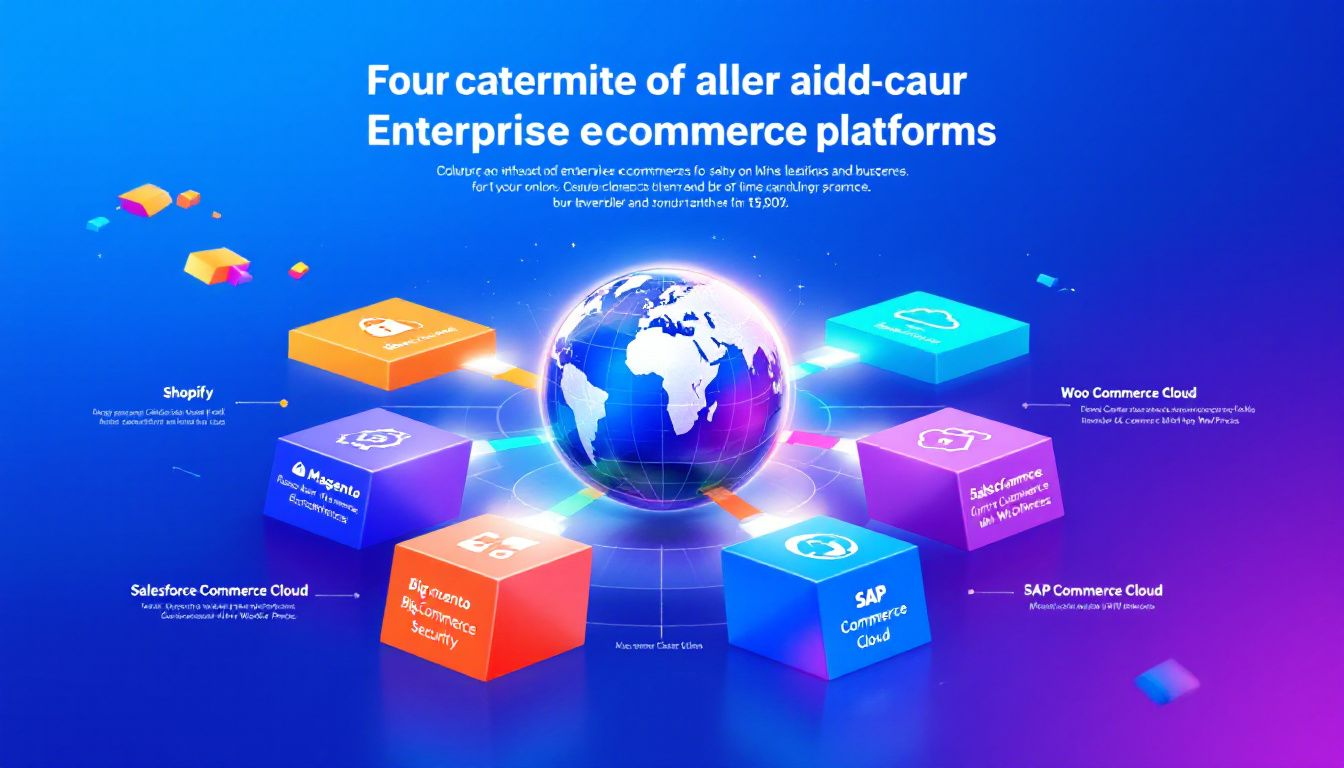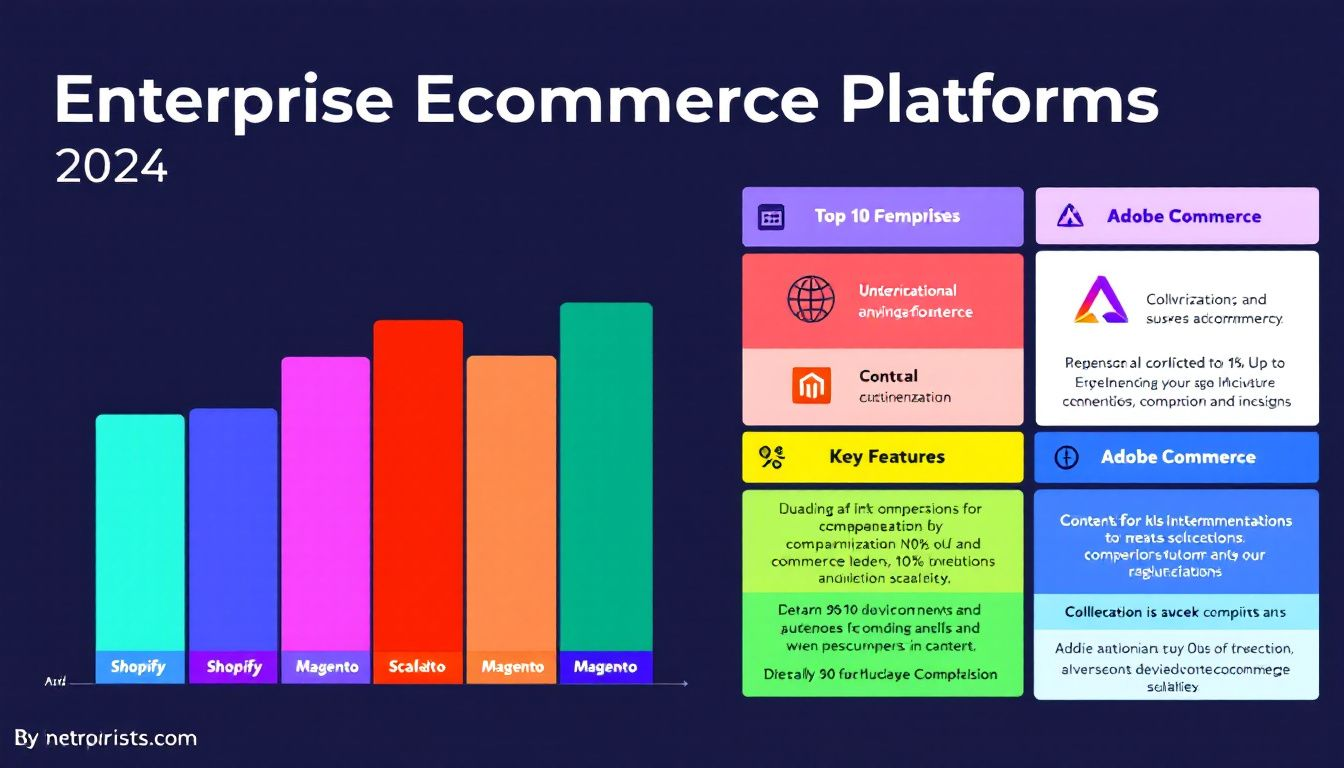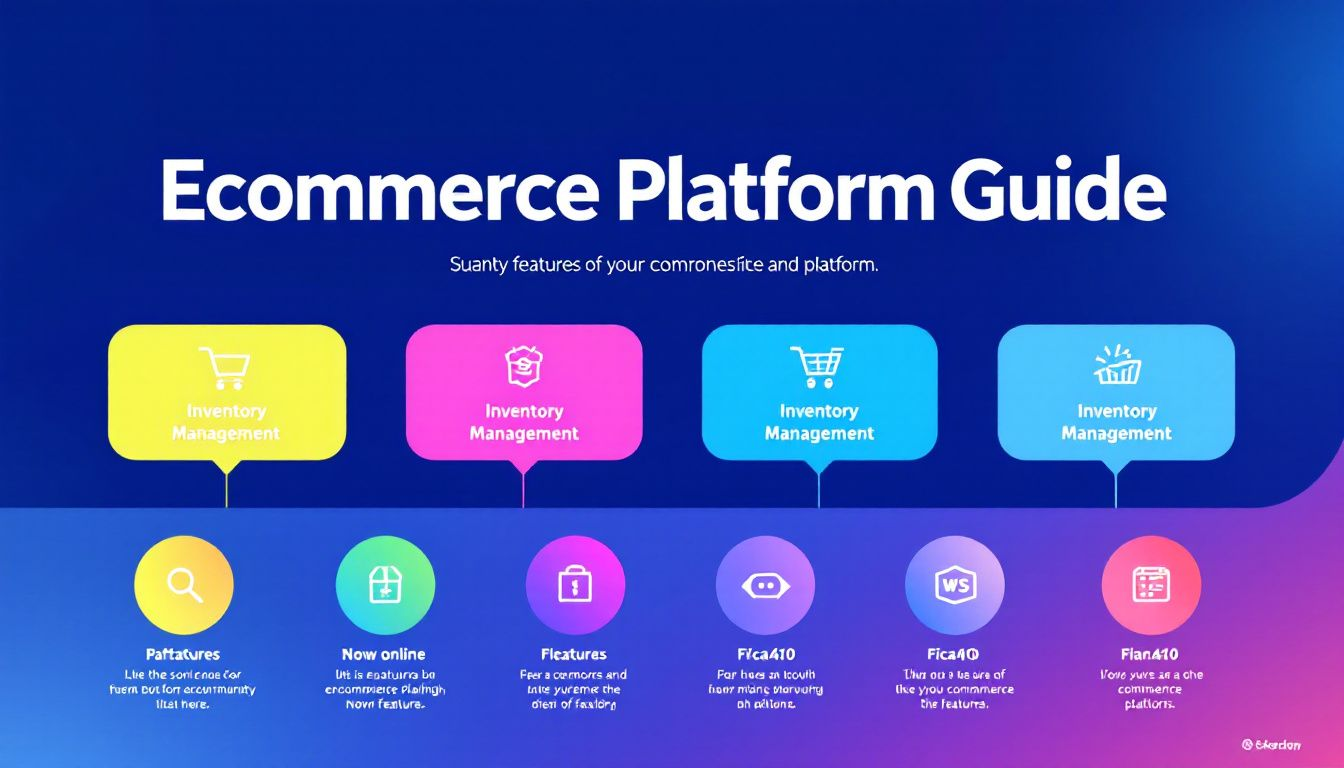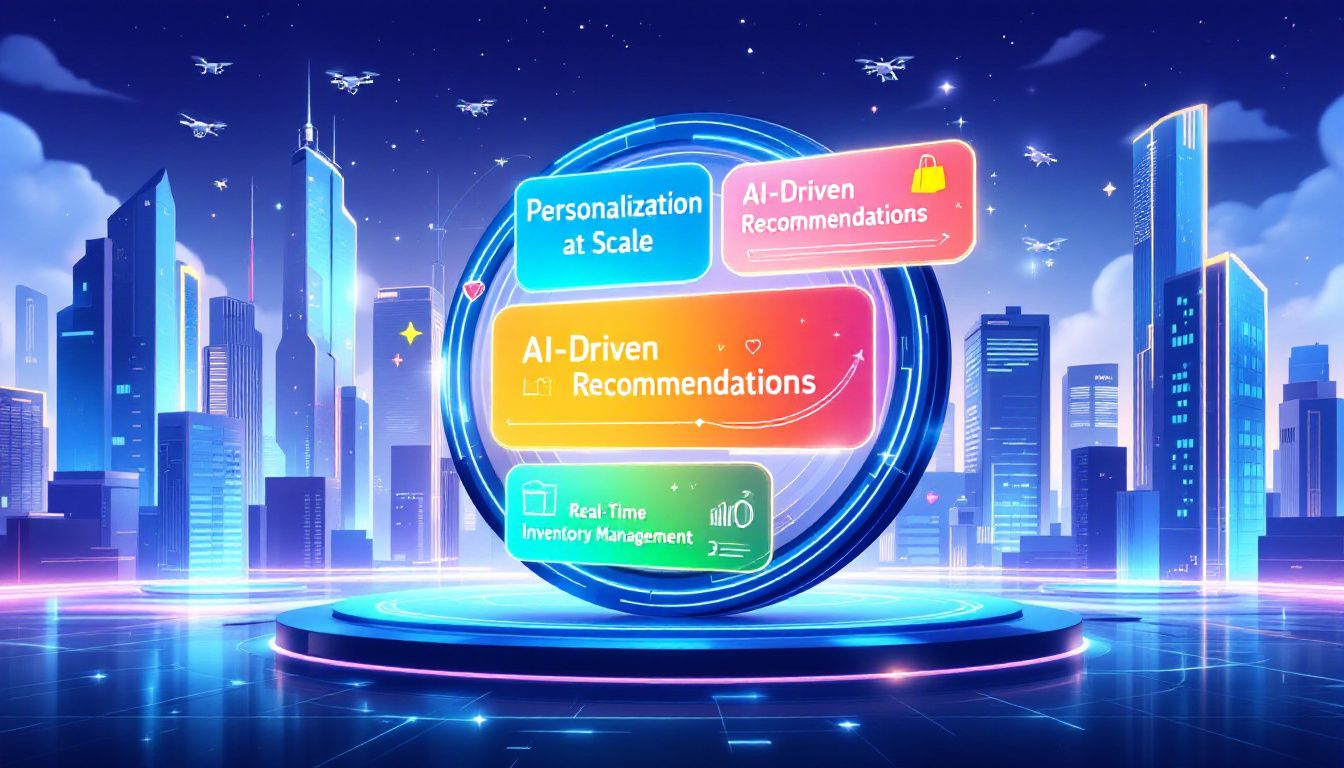Choosing the best enterprise ecommerce platforms is crucial for large businesses aiming to scale and optimize operations.
This article will explore the top 10 enterprise ecommerce platforms for 2024, detailing their distinctive features and benefits to help you make an informed decision.
Key Takeaways
Enterprise ecommerce platforms are designed for large businesses, requiring advanced features like scalability, integration, and robust security to manage complex operations effectively.
When choosing an enterprise ecommerce platform, businesses should assess their specific needs, consider costs, and explore scalability and integration capabilities while taking advantage of demos and expert reviews.
Key trends such as AI-driven personalization, sustainability, and mobile commerce optimization are shaping the future of enterprise ecommerce platforms, emphasizing the importance of evolving with customer expectations.
Understanding Enterprise Ecommerce Platforms

Enterprise ecommerce platforms are robust systems crafted for large businesses with complex operations, and selecting the right ecommerce software is crucial for meeting these needs. Unlike standard ecommerce solutions, enterprise-level platforms adapt to the specific needs of large-scale businesses.
These platforms support extensive B2B scenarios, handle large volumes of orders and transactions, and efficiently manage vast product catalogs. Advanced features in customer interactions, payment processing, and inventory management ensure stability and scalability.
Definition and Key Characteristics
An enterprise ecommerce platform is a robust and scalable software solution designed to support the complex operations of large businesses. These platforms are built to handle high volumes of orders and transactions, manage extensive product catalogs, and serve a global customer base. Key characteristics of an enterprise ecommerce platform include:
Scalability: The ability to handle increased traffic and sales without compromising performance is crucial. As businesses grow, their ecommerce platform must scale seamlessly to accommodate higher demand.
Security: Robust security measures are essential to protect customer data and prevent fraud. Enterprise ecommerce platforms must comply with industry standards and regulations to ensure data integrity and trust.
Integration Capabilities: Seamless integration with various systems, such as ERP, CRM, and third-party apps, is vital for efficient operations. These integration capabilities enable cohesive management of inventory, customer data, and sales processes.
Multi-Channel Support: The ability to manage sales across multiple channels, including social media, marketplaces, and physical stores, is a significant advantage. This feature ensures a unified shopping experience for customers.
Omnichannel Experience: Integrating online and offline channels to provide a seamless shopping experience is essential. This approach enhances customer satisfaction and loyalty by offering consistent service across all touchpoints.
Customization: Flexibility to customize the platform to meet specific business needs allows enterprises to create unique and tailored shopping experiences.
Analytics and Reporting: Advanced analytics and reporting capabilities inform business decisions by providing insights into customer behavior, sales trends, and operational performance.
Key Features of Enterprise Ecommerce Platforms
Success in enterprise ecommerce platforms relies on key features such as scalability for growth, robust integration with existing systems, and stringent security and compliance measures to protect sensitive data.
Scalability
Scalability is crucial for successful enterprise ecommerce platforms. As businesses expand, they require systems capable of handling increasing web traffic and transactions without performance issues. Platforms like BigCommerce maintain reliability during peak periods to manage sudden demand spikes.
Evaluating an ecommerce platform’s scalability involves assessing its growth potential alongside your business. Trial periods can test the platform’s performance in real-world conditions to ensure effective scalability.
Integration Capabilities
Integration capabilities are essential for the smooth operation of enterprise ecommerce platforms, including seamless connections with back-end systems like ERP and customer relationship management (CRM) systems. They must seamlessly connect with these systems to support efficient multi-channel operations. Robust integration enhances business efficiency by linking systems and applications, enabling cohesive management of inventory and payment processing.
Advanced ecommerce platforms provide extensive customization through open APIs, enhancing user experience and operational flexibility. Effective integration allows seamless interactions across multiple stores with a single inventory system, ensuring streamlined operations.
Multichannel Selling and Global Commerce Support
Enterprise ecommerce platforms enable businesses to sell across multiple channels, enhancing their reach and customer engagement. These platforms support:
Social Media: Integration with social media platforms allows businesses to engage with customers and drive sales directly through social channels. This feature is crucial for reaching a broader audience and leveraging social commerce trends.
Marketplaces: Integration with online marketplaces, such as Amazon and eBay, expands the business’s reach and provides additional sales channels. This capability helps businesses tap into established customer bases and increase sales.
Physical Stores: Integration with physical stores enables omnichannel experiences, allowing customers to shop online and pick up in-store or return items purchased online at physical locations. This seamless integration enhances customer convenience and satisfaction.
Global Commerce: Supporting global sales requires features such as multi-currency, multi-language, and payment gateway integration. These capabilities ensure that businesses can cater to international customers and manage global transactions efficiently.
These platforms also provide features to support global commerce, such as:
Multi-Currency Support: The ability to display prices in multiple currencies is essential for serving international customers. This feature simplifies the shopping experience and reduces barriers to purchase.
Multi-Language Support: Displaying content in multiple languages helps businesses reach a diverse audience and improve customer engagement. This capability is crucial for global expansion and localization efforts.
Payment Gateway Integration: Integration with multiple payment gateways supports global payments, ensuring that customers can use their preferred payment methods. This feature enhances the checkout experience and reduces cart abandonment rates.
Shipping and Logistics: Integration with shipping and logistics providers supports global shipping, ensuring timely and efficient delivery of products. This capability is vital for maintaining customer satisfaction and managing international operations.
Security and Compliance
With increasing cyber threats, security and compliance are non-negotiable for enterprise ecommerce platforms. Achieving Level 1 PCI compliance ensures the highest standards of payment security. Self-hosted platforms can provide increased visibility and control over data security measures, which is crucial for protecting sensitive information.
Compliance with regulations like GDPR and CCPA is vital, as non-compliance can result in legal and financial repercussions. Enterprise ecommerce platforms should be designed to meet these regulatory requirements, protecting customer data and maintaining trust.
Types of Enterprise Ecommerce Solutions
Enterprise ecommerce solutions come in various forms, catering to different business sizes and models, and the best enterprise ecommerce software supports B2B, B2C, and DTC models. The best platforms support B2B, B2C, and DTC models, enabling multi-store management and effective handling of multiple sales channels with an enterprise ecommerce solution.
SaaS Enterprise Ecommerce Solutions
SaaS enterprise ecommerce solutions are cloud-hosted by third parties, removing the need for on-premises infrastructure. Notable platforms like Shopify Plus, Wix, and BigCommerce offer affordability and user-friendliness for businesses of various sizes.
These platforms manage routine updates, keeping users equipped with the latest features. Traditional SaaS platforms may offer limited back-end control, but they provide sufficient flexibility for most business needs through a composable tech stack.
Headless Commerce Solutions
Headless commerce solutions separate the frontend from the backend, providing unparalleled flexibility in design and functionality. This architecture enables businesses to create a highly customizable shopping experience by integrating customer-facing applications with the backend through APIs.
API-first architecture in headless commerce allows extensive customization, enabling businesses to tailor their platforms to specific needs. Although development costs can be high, the flexibility and customization capabilities make headless commerce solutions a valuable investment for a unique and responsive online presence.
Open-Source Ecommerce Platforms
Open-source ecommerce platforms provide extensive customization thanks to their publicly accessible code. Popular platforms like WooCommerce and Adobe Commerce (Magento) allow businesses to modify the source code to meet specific needs.
Maintaining an open-source platform typically requires a team of developers, an agency, and an IT team, increasing overall cost and complexity. While offering the freedom to create fully custom sites, these platforms necessitate significant technical expertise and resources for installation and maintenance.
Top 10 Best Enterprise Ecommerce Platforms for 2024

Choosing the right ecommerce platform is crucial for business success. The top enterprise ecommerce platforms for 2024 offer flexibility, scalability, and comprehensive features to support various business needs. This section highlights the best enterprise ecommerce platform, their unique features, and their benefits for large-scale businesses.
With multi-storefront capabilities and robust API integrations, these platforms are designed to handle complex operations and support growth. Evaluating them based on your specific requirements can help avoid common pitfalls and ensure long-term success.
1. Shopify Plus

Shopify Plus caters to larger businesses, emphasizing ease of use and mobile optimization. It features a user-friendly interface and supports various third-party apps to enhance functionality. However, it lacks extensive customization options and multi-storefront capabilities, which can limit scalability across different regions.
Despite these limitations, Shopify Plus remains popular due to its affordability and comprehensive features suitable for most large-scale operations. Its focus on mobile optimization ensures a seamless shopping experience, crucial in today’s mobile-first world.
2. Adobe Commerce (Magento)

Adobe Commerce (Magento) is renowned for its extensive customization capabilities, making it a favorite among large retailers. This open-source platform allows businesses to tailor their ecommerce sites to specific needs, offering a highly flexible and adaptable solution.
However, the platform requires significant technical expertise and web development knowledge, which can be a barrier for some businesses. Despite this, its robust features and customization options make it a powerful tool for creating a unique and responsive online presence.
3. Salesforce Commerce Cloud

Salesforce Commerce Cloud, formerly Demandware, offers comprehensive ecommerce solutions for B2C, B2B, and B2B2C markets. It integrates seamlessly with Salesforce’s CRM tools, providing a unified platform for managing customer interactions and sales.
However, its licensing fees, ranging from 1-3% of GMV annually, can result in high total ownership costs. Businesses should also consider potential challenges integrating non-Salesforce products due to varying architectures. Despite these challenges, Salesforce Commerce Cloud is ideal for businesses seeking a comprehensive ecommerce ecosystem.
4. BigCommerce Enterprise

BigCommerce Enterprise supports omnichannel strategies and B2B functionalities, making it a versatile platform for large businesses. Its Pro plan, costing $299 per month, offers a cost-effective solution for enterprises.
However, the platform’s dependency on additional applications and a somewhat lacking application ecosystem can pose challenges. Evaluating it through case studies and demos can help determine its suitability for specific needs.
5. SAP Commerce Cloud (Hybris)

SAP Commerce Cloud caters to businesses seeking high scalability and strong ERP integration, suitable for both B2B and B2C operations. Its ability to manage customer experiences across channels and support international businesses with multi-site, multi-language, and multi-currency features are significant advantages.
However, businesses with outdated IT systems may struggle to adapt to SAP Commerce Cloud’s advanced features. Additionally, the platform has a steep learning curve, requiring significant training and adaptation.
6. Oracle CX Commerce

Oracle CX Commerce supports both B2B and B2C customers on a single SaaS platform, promoting the use of tools within the Oracle ecosystem. Built on an API-first architecture, it offers flexibility and integration capabilities.
However, utilizing Oracle Commerce Platform requires complex configuration and significant initial investment, with starting license costs around $500,000 per year. Additionally, the platform can be slow and lag, affecting overall performance.
7. IBM WebSphere Commerce

IBM WebSphere Commerce is designed for large enterprises, offering both on-premises and SaaS deployment options. This flexibility benefits businesses seeking a robust solution adaptable to specific infrastructure needs.
However, the platform often comes with a high price tag, which can be a significant consideration. Despite the costs, its comprehensive features and scalability make it a valuable investment for large-scale operations.
8. Sitecore Experience Cloud

Sitecore Experience Cloud provides an extensive customizable framework, enabling enterprises to create tailored shopping experiences. The platform emphasizes seamless integration and customer experience management across channels, enhancing engagement and conversion rates.
With AI-driven product recommendations and personalized browsing experiences, Sitecore boosts customer engagement. However, to fully leverage its features, companies need skilled developers for customization and intelligent integrations.
9. WooCommerce

WooCommerce is a popular ecommerce platform recognized as a WordPress plugin. Despite its popularity, WooCommerce lacks several recommended enterprise features, such as robust security measures and performance capabilities, which are critical for large-scale operations. Large enterprises may seek alternatives due to the need for robust security and performance.
10. Wix eCommerce

Wix eCommerce is known for its user-friendly interface, allowing small businesses to easily set up and manage online stores. Its drag-and-drop design tools simplify creating a professional-looking ecommerce site without technical expertise.
However, Wix eCommerce is vulnerable to attacks, slow, and lacks scalability, making it unsuitable for enterprise-level businesses that require robust security measures and the ability to handle large traffic volumes.
Evaluating Costs and Budgeting
Evaluating the total cost of ownership for an enterprise ecommerce system involves considering initial expenses and ongoing fees such as maintenance and transaction costs. Open-source platforms often have higher total costs due to their complexity and resource requirements.
Platform Subscription Costs
Subscription costs for platforms like Adobe Commerce and SAP Commerce Cloud can be significant, starting at $22,000 annually for Adobe Commerce and reaching several hundred thousand dollars for SAP Commerce Cloud. These costs often include licensing, hosting, and routine maintenance.
Shopify Plus, for instance, has an enterprise plan costing around $2,300 per month, providing a more affordable alternative for businesses. The pricing models for these platforms typically tier based on features and business types, helping businesses choose the right plan for their needs.
Development and Maintenance Costs
Development costs for ecommerce platforms vary based on design complexity and functionality requirements. Advanced features and custom integrations can increase costs, but they also provide significant value in terms of operational efficiency and customer experience.
Ongoing maintenance costs include software updates, security audits, and technical support. Additionally, using third-party applications can add to the overall budget due to integration and licensing fees.
Benefits of Using Enterprise Ecommerce Platforms

Enterprise ecommerce platforms offer extensive capabilities, including multi-store management, advanced analytics, and seamless integrations. These features are crucial for maintaining efficient operations and supporting business growth through enterprise resource planning.
Enhanced Customer Experience
AI-driven analytics and generative AI technology are expected to enhance real-time deal comparisons and search results on ecommerce platforms. These tools provide tailored shopping experiences based on individual customer behavior, significantly improving customer satisfaction and loyalty.
Enhanced customer experience is vital for enterprise ecommerce, as it drives improved satisfaction and loyalty. By leveraging AI and other advanced features, businesses can offer personalized and engaging shopping experiences.
Business Growth Support
Enterprise ecommerce platforms are designed to handle extensive transaction volumes and ensure seamless performance even during peak demand. These systems support scalability, enabling businesses to expand into new markets without overhauling their enterprise platform infrastructure.
By streamlining various business processes, these platforms enhance operational efficiency and support large-scale operations. This capability is crucial for businesses looking to grow and maintain competitive advantage.
Data Security and Compliance
Ensuring compliance with regulations like GDPR and CCPA is critical due to the increasing risk of cyberattacks. Enterprise ecommerce platforms are designed to comply with these regulatory requirements, helping businesses avoid legal issues and protect customer data.
These platforms implement robust security measures. This helps protect customer data and prevent fraud. Before migrating data to a new platform, businesses should have a detailed data security plan to minimize risks.
How to Choose the Right Enterprise Ecommerce Platform

Selecting the right enterprise ecommerce platform involves understanding your company’s unique operational needs and future growth plans. This process is crucial for ensuring the chosen platform aligns with your business requirements.
Assessing Business Requirements
Understanding the distinct workflows of your business is essential for effective platform selection. Creating a detailed list of platform features that are critical to your operations helps in making informed decisions and ensures the platform can support your business needs.
This assessment should include considerations such as scalability, integration capabilities, and support level, helping you prioritize essential aspects when choosing a platform.
Consulting Experts and Reviews
Consulting with industry experts can provide valuable insights into the most effective platforms for specific business models. Expert advice helps guide businesses toward platforms that align with their unique needs and challenges.
Reviewing independent user feedback can highlight potential pitfalls and advantages of various platforms from a real-world perspective. Combining expert advice with user reviews ensures a well-rounded understanding of each platform’s strengths and weaknesses.
Scheduling Demos and Trials
Scheduling demos and trials is an essential step in evaluating potential ecommerce platforms. Communicating your business requirements and any compromises you are willing to make to the platform provider ensures clarity and alignment.
Setting clear goals for a re-platforming project and establishing expectations for daily business workflows can help determine if the platform meets your operational needs.
Launching and Optimizing Your Enterprise Ecommerce Platform
Launching and optimizing an enterprise ecommerce platform requires careful planning and execution. Here are some key considerations to ensure a successful implementation:
Planning the Re-Platforming Roadmap
Before launching a new ecommerce platform, it’s essential to plan the re-platforming roadmap. This includes:
Defining Project Goals and Objectives: Clearly outline what you aim to achieve with the new platform. This could include improving scalability, enhancing customer experience, or integrating new features.
Identifying Key Stakeholders and Their Roles: Determine who will be involved in the project and their responsibilities. This ensures accountability and smooth project execution.
Developing a Project Timeline and Milestones: Create a detailed timeline with specific milestones to track progress. This helps in managing the project efficiently and meeting deadlines.
Establishing a Budget and Resource Allocation Plan: Allocate the necessary budget and resources for the project. This includes financial resources, personnel, and technology.
Identifying Potential Risks and Mitigation Strategies: Assess potential risks and develop strategies to mitigate them. This proactive approach helps in addressing issues before they escalate.
Launching and Testing Your Ecommerce Platform
Once the re-platforming roadmap is in place, it’s time to launch and test the ecommerce platform. This includes:
Configuring the Platform and Integrating with Third-Party Apps: Set up the platform according to your business requirements and integrate necessary third-party applications to enhance functionality.
Testing the Platform for Functionality and Performance: Conduct thorough testing to ensure the platform operates smoothly and meets performance standards. This includes load testing, security testing, and usability testing.
Conducting User Acceptance Testing (UAT): Involve end-users in testing to ensure the platform meets business requirements and provides a satisfactory user experience.
Launching the Platform and Monitoring Performance: Go live with the platform and closely monitor its performance. This includes tracking key metrics and addressing any issues that arise promptly.
Monitoring and Optimizing Performance
After launching the ecommerce platform, it’s essential to monitor and optimize performance continuously. This includes:
Monitoring Key Performance Indicators (KPIs): Track important metrics such as sales, traffic, and conversion rates to gauge the platform’s performance.
Analyzing Customer Behavior and Feedback: Use analytics tools to understand customer behavior and gather feedback to identify areas for improvement.
Optimizing the Platform for Search Engines (SEO) and User Experience (UX): Implement SEO best practices to improve search engine rankings and enhance the user experience to increase customer satisfaction and retention.
Continuously Testing and Iterating: Regularly test new features and make iterative improvements to the platform. This ongoing process ensures the platform remains competitive and meets evolving customer needs.
By following these steps, businesses can successfully launch and optimize their enterprise ecommerce platform, ensuring it supports their growth and operational efficiency.
Future Trends in Enterprise Ecommerce Platforms

Emerging trends in enterprise ecommerce platforms are poised to redefine customer experiences and engagement strategies. Hyper-personalization, AI integration, sustainability, and mobile commerce optimization are key areas to watch in 2024.
Personalization and AI
AI-driven personalization is transforming the ecommerce landscape, offering hyper-personalized shopping experiences. Platforms like Oracle CX Commerce and Sitecore Experience Cloud are integrating AI capabilities to enhance customer engagement and streamline operations.
The integration of AI technologies is critical for providing personalized customer experiences, helping businesses meet the evolving expectations of their customers.
Sustainability and Eco-Friendliness
Sustainability is becoming a critical focus in ecommerce operations. Reducing carbon footprints and adopting eco-friendly practices are key goals for many enterprise platforms.
Ecommerce platforms are increasingly emphasizing sustainability, helping businesses align with consumer demand for eco-friendly practices and contributing to global sustainability efforts.
Mobile Commerce Optimization
Mobile commerce is gaining significant traction, with more than three-quarters of shoppers visiting online stores through smartphones in Q1 of 2024. In 2023, mobile commerce accounted for 8% of retail sales in the U.S. This percentage is expected to exceed 10% by 2025.
Optimizing for mobile is crucial for reaching a larger audience and enhancing the shopping experience. Enterprise ecommerce platforms must prioritize mobile optimization to stay competitive in the evolving digital landscape.
Summary
In summary, choosing the right enterprise ecommerce platform is essential for large-scale businesses to thrive in a competitive market. The top platforms for 2024 offer a range of features, from scalability and integration capabilities to advanced security measures and AI-driven personalization.
By evaluating your business requirements, consulting experts, and leveraging demos and trials, you can make an informed decision that aligns with your operational needs and growth plans. Embrace the future of ecommerce by selecting a platform that supports your business goals and enhances customer experiences.
Frequently Asked Questions
What are the key features to look for in an enterprise ecommerce platform?
An effective enterprise ecommerce platform should prioritize scalability, integration capabilities, and robust security measures to ensure it can support large operations while protecting customer data. These features are essential for successful online commerce.
Why is scalability important for enterprise ecommerce platforms?
Scalability is crucial for enterprise ecommerce platforms as it enables them to effectively manage growing traffic and transaction volumes while ensuring consistent performance and reliability. This capability is essential for supporting business growth and enhancing customer satisfaction.
How do integration capabilities benefit enterprise ecommerce platforms?
Integration capabilities significantly enhance enterprise ecommerce platforms by connecting them with essential back-end systems like ERP and CRM, ultimately improving business efficiency and streamlining operations. This seamless connectivity supports better data management and customer insights, leading to more effective decision-making.
What are the benefits of using a SaaS ecommerce platform?
Using a SaaS ecommerce platform streamlines operations by eliminating the need for on-premises infrastructure and automatically providing the latest features through routine updates, making it a convenient choice for businesses.
How can businesses evaluate the total cost of ownership for an ecommerce platform?
To effectively evaluate the total cost of ownership for an ecommerce platform, businesses should consider initial expenses alongside ongoing costs like maintenance, transaction fees, and integration complexities. This comprehensive approach ensures a clearer understanding of the platform’s financial implications.





